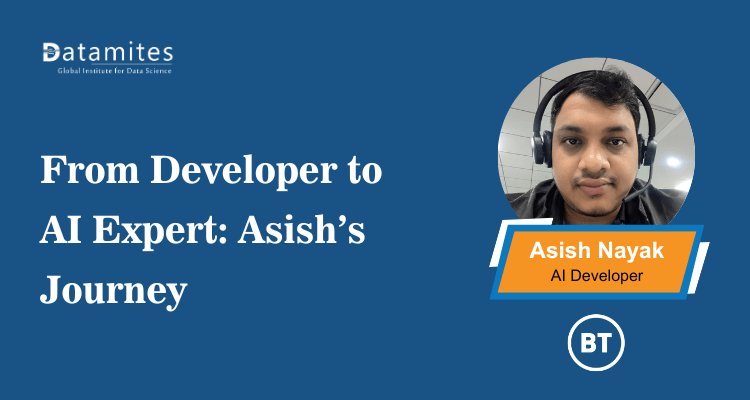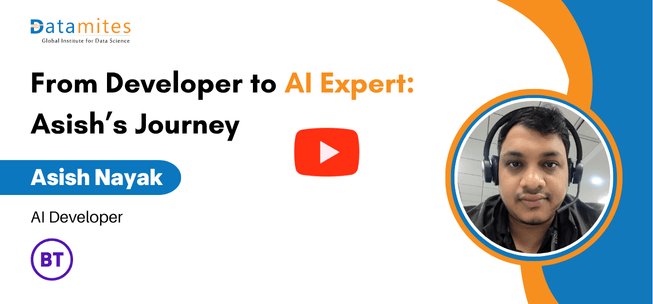From Software Developer to AI Expert: Ashish Nayak’s Journey to Success
Discover how Ashish Nayak transformed his career from a software developer to an AI expert. Learn his inspiring journey, practical tips, and strategies for mastering data science and artificial intelligence.

In today’s fast-paced tech world, the journey from writing code to building intelligent systems might seem daunting but it’s not impossible. Meet Ashish Nayak, a software developer who transformed his career by diving into the world of Artificial Intelligence and Data Science. With years of experience tackling complex datasets, designing machine learning models, and navigating the challenges of big data, Ashish’s story is not just inspiring, it's a roadmap for anyone looking to break into AI. In this blog, we unravel his journey, uncover the strategies that propelled him forward, and provide actionable insights for aspiring data scientists ready to take their career to the next level.
Ashish Nayak Q&A: Insights, Career Journey, and Tips for Aspiring AI Expert
In this Q&A session, he shares practical insights, career tips, and strategies for aspiring data scientists and AI professionals.
Q1: Can you briefly introduce yourself and your current role?
Hi, I’m Ashish Nayak. I have 6 years of experience as a software engineer and over 2 years as a data scientist. Currently, I work as a Data Scientist and Data Quality Engineer at British Telecom Digital. My role involves handling large datasets, performing in-depth data analysis, and providing AI and ML solutions, including working with Gen AI and LLM models.
Q2: What motivated you to transition from software engineering to data science and AI?
Back in 2018, AI and machine learning were gaining huge popularity. I was working in a non-technical IT role and felt stuck in my career. My interest in AI/ML models grew, and a friend recommended DataMites, where I learned all the necessary skills. It was a turning point in my career, and the support from trainers made learning practical and engaging.
Q3: How did DataMites support your learning journey?
The training at DataMites was excellent. It included software requirement documentation, hands-on exercises, and constant support. For example, whenever I faced coding issues, our trainer Ashok helped me solve them. I can confidently say that with the right guidance, anyone can successfully enter the field of data science and AI.
Q4: What advice would you give students about learning AI and ML?
AI and ML are here to stay, so prepare yourself thoroughly. Focus on:
- Statistics: Understanding data and interpreting results is more important than just coding.
- Coding skills: Knowing Python and SQL is essential but can be learned quickly.
- Data analysis: Your ability to analyze data and present actionable insights is what businesses value most.
Q5: Can you share some examples of projects you are currently working on?
At British Telecom, I’m involved in data governance and customer behavior analysis projects. For instance:
- Analyzing why a customer abandons a product in the cart.
- Identifying whether high cost, website issues, or other factors caused the drop.
- Using Gen AI and LLM models to trigger personalized notifications or discounts to encourage purchases.
Q6: How should students choose a specialization in AI or data science?
AI has multiple domains: voice processing, image processing, text processing, classification, and regression. Choosing a specialization depends on your interest and what you can deliver effectively. For example, I focus on classification and regression, working primarily with structured data.
Q7: Which projects make students more marketable to companies?
From my experience:
- Text processing (NLP, NLU, NLG): Even though basic text processing is considered old, it is foundational for LLMs and useful in real-world applications.
- Image processing: Learning image recognition, object detection, or image classification boosts employability.
- Having a solid understanding of NLP concepts is an added advantage, even for advanced LLM projects.
Q8: How do projects help in interviews?
Projects play a crucial role in interviews as they demonstrate your practical understanding and problem-solving abilities. Interviewers often focus on your project experience to assess how well you can apply theoretical concepts to real-world scenarios. They may ask why you selected a particular algorithm or approach, so it’s important to explain your trial-and-error process and the reasoning behind your final choice.
Q9: How much time should students dedicate to learning AI/ML?
Students aiming to learn AI and ML should dedicate around 3–4 hours daily, especially if they plan to transition into data science within a few months. The focus should be on mastering core areas such as statistics, programming, and hands-on projects, as practical application is key to understanding complex concepts. Even after entering the industry, continuous learning is essential. Spending 1–2 hours a few times a week helps keep skills updated and sharp.
Q10: How important are hands-on projects for interviews?
Hands-on projects are extremely important for interviews as they showcase your ability to apply theoretical knowledge to real-world problems. They reflect your decision-making skills, such as why you chose a specific algorithm, and demonstrate your practical understanding of handling data preprocessing, managing missing values, or working with unstructured data. Projects also highlight your technical depth through aspects like hyperparameter tuning, model evaluation, and deployment strategies.
Read these below articles:
- From Graduate to AI/ML Engineer: Santhosh’s Journey
- Asharani’s Success Story: From Billing Specialist to AI/ML Engineer
- Amaan’s Journey: Verification Analyst to AI Developer
Key Findings from Ashish Nayak’s Journey and Insights
These key findings highlight his career insights, practical tips, and strategies for aspiring AI professionals.
Career Background
- 6 years as a software engineer and 2+ years as a data scientist.
- Currently works as a Data Scientist and Data Quality Engineer at British Telecom Digital, handling large datasets, AI/ML solutions, and LLM models.
Motivation to Switch to AI/ML
- Felt stuck in a non-technical IT role in 2018.
- Inspired by the rising popularity of AI and ML.
- Joined DataMites to gain practical skills in data science and AI.
Support and Learning at DataMites
- Training included software requirement documentation, hands-on exercises, and continuous guidance.
- Personalized help from trainers made coding and AI concepts easier to grasp.
Essential Skills for AI/ML
- Statistics: Core to understanding and interpreting data.
- Coding Skills: Python and SQL are necessary but quickly learnable.
- Data Analysis: Ability to draw insights and communicate results is highly valued.
Current Projects
- Data governance and customer behavior analysis.
- Example: Analyzing abandoned shopping carts, identifying reasons (price, website issues), and using Gen AI/LLM models to trigger notifications or discounts.
Ashish’s journey shows that a successful career in AI and data science depends on mastering statistics, data analysis, coding, and hands-on projects. For aspiring professionals, understanding data and its business impact matters more than coding alone. With consistent learning and proper guidance, pursuing a Machine Learning Course in Chennai is within reach. According to MarketsandMarkets, the generative AI market is set for remarkable expansion, expected to rise from USD 71.36 billion in 2025 to USD 890.59 billion by 2032, registering a CAGR of 43.4% throughout the forecast period.
Chennai, known as the “Detroit of India” due to its flourishing automotive and manufacturing sectors, is quickly emerging as a key hub for Artificial Intelligence Training in Chennai. With its strong IT infrastructure, vibrant startup ecosystem, and leading educational institutions, the city is fostering AI research, innovation, and widespread adoption across various industries.
DataMites Artificial Intelligence Course in Chennai focuses on equipping learners with the skills needed for a successful career in AI. To accommodate diverse learning preferences, Datamites institute offers classroom training at centers in Anna Nagar, Guindy, and Perungudi, live online interactive sessions for remote learners, and self-paced recorded courses for those seeking flexible learning options.
Read these below articles:
- Multimodal Neurons in Artificial Neural Networks
- How Does Artificial Intelligence Help Astronomy?
- List Of Generative Adversarial Networks Applications

